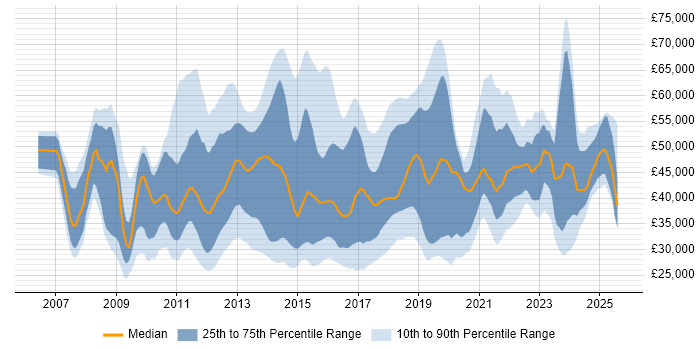VMware Infrastructure (VI3)
West Midlands > Birmingham
The table below provides summary statistics and salary benchmarking for jobs advertised in Birmingham requiring VMware Infrastructure skills. It covers permanent job vacancies from the 6 months leading up to 28 February 2026, with comparisons to the same periods in the previous two years.
| 6 months to 28 Feb 2026 |
Same period 2025 | Same period 2024 | |
|---|---|---|---|
| Rank | 101 | 89 | 61 |
| Rank change year-on-year | -12 | -28 | +25 |
| Permanent jobs citing VMware Infrastructure | 5 | 30 | 73 |
| As % of all permanent jobs in Birmingham | 0.24% | 1.81% | 3.63% |
| As % of the System Software category | 8.77% | 18.07% | 30.67% |
| Number of salaries quoted | 5 | 20 | 70 |
| 10th Percentile | £43,200 | £38,178 | £26,250 |
| 25th Percentile | £55,500 | £43,250 | £29,500 |
| Median annual salary (50th Percentile) | £60,000 | £50,000 | £45,750 |
| Median % change year-on-year | +20.00% | +9.29% | -3.68% |
| 75th Percentile | £66,500 | £52,500 | £60,000 |
| 90th Percentile | £67,100 | £59,375 | £115,000 |
| West Midlands median annual salary | £56,500 | £45,000 | £42,500 |
| % change year-on-year | +25.56% | +5.88% | -6.59% |
All System Software Skills
Birmingham
VMware Infrastructure falls under the System Software category. For comparison with the information above, the following table provides summary statistics for all permanent job vacancies requiring system software skills in Birmingham.
| Permanent vacancies with a requirement for system software skills | 57 | 166 | 238 |
| As % of all permanent jobs advertised in Birmingham | 2.69% | 10.00% | 11.84% |
| Number of salaries quoted | 33 | 90 | 205 |
| 10th Percentile | £30,250 | £34,000 | £28,000 |
| 25th Percentile | £46,000 | £42,688 | £32,500 |
| Median annual salary (50th Percentile) | £65,000 | £50,000 | £47,500 |
| Median % change year-on-year | +30.00% | +5.26% | -13.64% |
| 75th Percentile | £75,000 | £62,500 | £63,750 |
| 90th Percentile | £78,790 | £80,000 | £86,485 |
| West Midlands median annual salary | £46,000 | £50,000 | £45,000 |
| % change year-on-year | -8.00% | +11.11% | - |
VMware Infrastructure
Job Vacancy Trend in Birmingham
Historical trend showing the proportion of permanent IT job postings citing VMware Infrastructure relative to all permanent IT jobs advertised in Birmingham.

VMware Infrastructure
Salary Trend in Birmingham
Salary distribution trend for jobs in Birmingham citing VMware Infrastructure.

VMware Infrastructure
Salary Histogram in Birmingham
Salary distribution for jobs citing VMware Infrastructure in Birmingham over the 6 months to 28 February 2026.
VMware Infrastructure
Co-Occurring Skills & Capabilities in Birmingham by Category
The following tables expand on the one above by listing co-occurrences grouped by category. They cover the same employment type, locality and period, with up to 20 co-occurrences shown in each category:
|
|
||||||||||||||||||||||||||||||||||||||||||||||||||||||||||||||||||||||||||||||
|
|
||||||||||||||||||||||||||||||||||||||||||||||||||||||||||||||||||||||||||||||
|
|
||||||||||||||||||||||||||||||||||||||||||||||||||||||||||||||||||||||||||||||
|
|
||||||||||||||||||||||||||||||||||||||||||||||||||||||||||||||||||||||||||||||
|
|
||||||||||||||||||||||||||||||||||||||||||||||||||||||||||||||||||||||||||||||
|
|
||||||||||||||||||||||||||||||||||||||||||||||||||||||||||||||||||||||||||||||
|
|||||||||||||||||||||||||||||||||||||||||||||||||||||||||||||||||||||||||||||||
